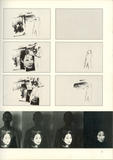
 Photothèque.imaginaire.de.Shuji.Terayama.-.Les.gens.de.la.famille.Chien.Dieu.[20....pages.only].rar [284.96 Mb]
Photothèque.imaginaire.de.Shuji.Terayama.-.Les.gens.de.la.famille.Chien.Dieu.[20....pages.only].rar [284.96 Mb] 

This remarkable collection of Shuji Terayama's photographs has been kindly scanned and shared by murdermystery@KaraGarga!!!



http://search.abaa.org/dbp2/book150502377.html
Shuji Terayama (寺山 修司, Terayama Shūji, December 10, 1935—May 4, 1983) was an avant-garde Japanese dramatist, writer, director, and photographer. He was one of the most productive and provocative creative artists from Japan. He was born December 10, 1935, the only son Terayama Hachiro and Terayama Hatsu in Hirosaki City in the northern Japanese prefecture of Aomori. His father was said to have died at the end of Pacific War in Indonesia in September of 1945. At the age of nine, his mother moved to Kyūshū to work at an American military base while he himself went to live with relatives in the city of Misawa, also in Aomori. At this same time, Terayama lived through the Aomori air raids that killed more than 30,000 people.
Terayama entered Aomori Prefectural High School in 1951, and in 1954 went to prestigious Waseda University's Faculty of Education to study Japanese language and literature. However, he soon dropped out because he fell ill with nephrotic syndrome. He received his education through working in bars in Shinjuku. His oeuvre consists of a number of essays claiming that more can be learned about life through boxing and horse racing than by attending school and studying hard. Accordingly, he was one of the central figures of the "runaway" movement in Japan in the late 1960s, as depicted in his book, play, and film "Throw Away Your Books, Run into the Streets! (書を捨てよ、町へ出よう)".
In 1967, Terayama formed the Tenjo Sajiki (天井桟敷)theater troupe, whose name comes from the Japanese translation of the 1945 Marcel Carné film "Les Enfants du Paradis", so can be translated as "children of heaven", though it has a meaning similar to the English expression "The Peanut Gallery". The troupe was dedicated to the avant-garde and staged a number of controversial plays tackling social issues from an iconoclastic perspective. Some major plays include "Bluebeard" (青ひげ ), "Yes"(イエス), and "The Crime of Fatso Oyama"(大山デブコの犯罪), among others. Also involved with the theater was artist Tadanori Yokoo (横尾忠則), who designed many of the advertisement posters for the group. Musically, he worked closely with experimental composer J.A. Seazer and folk musician Mikami Kan.
He was also involved in poetry and at 18 was the second winner of the Tanka Studies Award.
Terayama experimented with ‘city plays’, a fantastical satire of civic life.
Also in 1967, Terayama started an experimental cinema and gallery called 'Universal Gravitation,' which is in fact still in existence at Misawa as a resource center. The Terayama Shuji Memorial Hall, which has a large collection of his plays, novels, poetry, photography and a great number of his personal affects and relics from his theatre productions, can also be found in Misawa.
Terayama published almost 200 literary works, and over 20 short and full-length films.
He was married to Tenjo Sajiki co-founder Kyoko Kujo (九條今日子), but they later divorced, although they continued to work together until Terayama's death on May 4, 1983 from cirrhosis of the liver.
(http://en.wikipedia.org/wiki/Shuji_Terayama)

